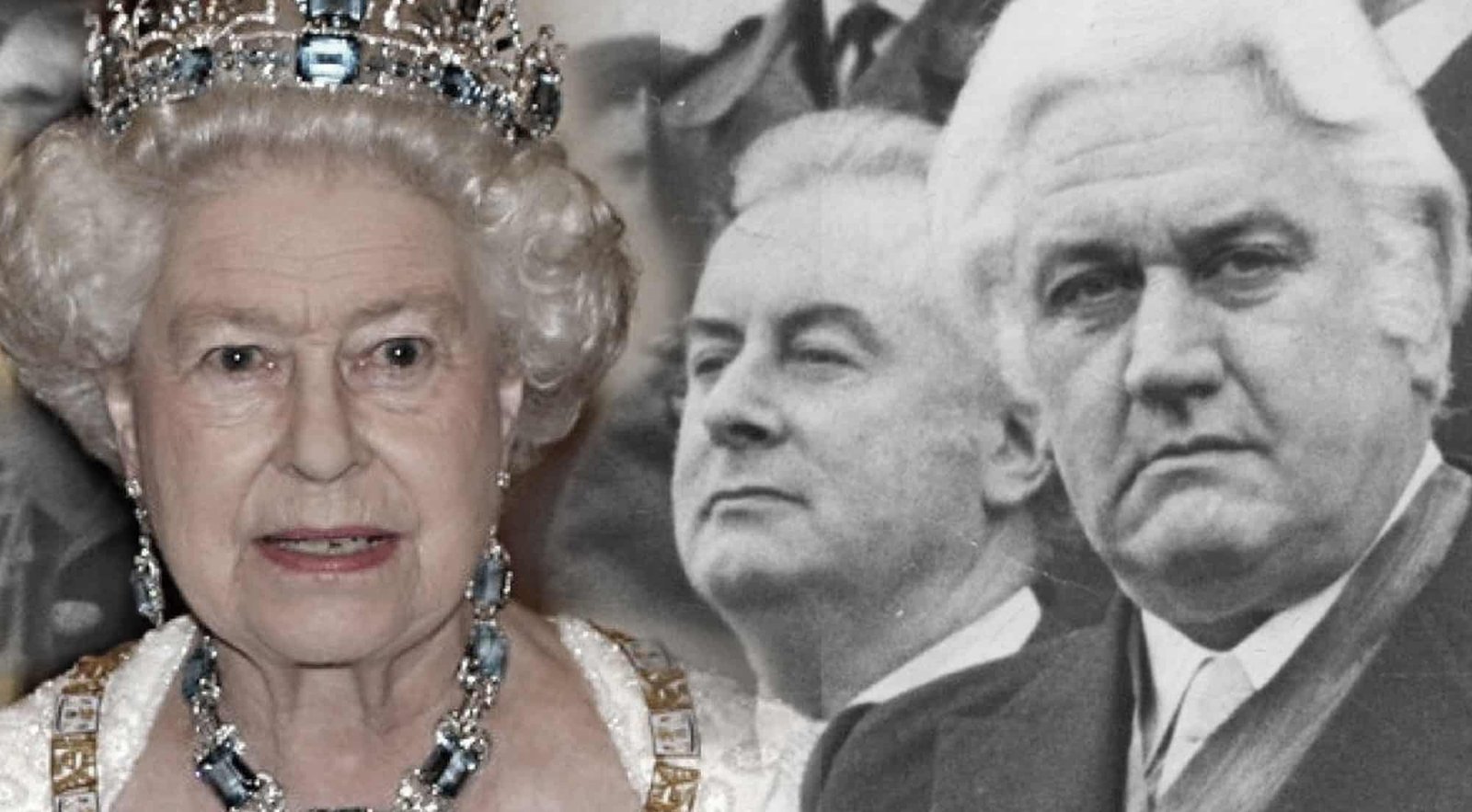
An important reckoning with a great historical injustice is underway in Australia which presents the world with a rare opportunity to look into the darker corners of the corridors of power too often ignored by even the most ardent truth seekers among us.
This reckoning has taken the form of a four-year, hard fought legal battle which a lone crowd funded Australian historian named Jenny Hocking waged in the highest courts of her nation to win the right on May 30, 2020 to make 211 secret letters held within Australia’s National Archives public for the first time since they were deposited in 1978.
These palace letters were written between the Queen of England (via her personal secretary) and her Governor General in Australia Sir John Kerr during the latter’s tenure as official Head of State during the interim of 1974-1978 and until last week’s court ruling, were intended to be kept hidden until December 8, 2037.
What makes these letters such a point of national controversy is that they contain information which will undoubtedly shed light upon the active role of the Queen herself in carrying out an act which essentially amounted to a modern coup d’état of November 11, 1975. During this sad period, Kerr made history by not only sacking the elected Prime Minister Gough Whitlam, but also revealed the scope and nature of the British Monarchy’s very real powers in our modern age.
These are bizarre god-like prerogative powers which those forces controlling today’s globally extended empire would much rather keep concealed from public view.
Gough Whitlam: An Intolerable Threat to the Empire
It is admittedly difficult for some westerners to contemplate how a white Commonwealth prime minister could suffer a coup in our modern times… are not coups usually something reserved for Asiatic, Latin American, or African revolutionary leaders?
When one looks upon a list of coups during the Cold War period, that has certainly tended to be the general rule… but like every rule, exceptions are always to be found.
By reviewing the nature of Whitlam’s political struggle, his policy reforms and greater vision for Australia, it becomes clear what sort of enemy he made and why the highest powers of the Five Eyes and Global Empire ousted him.
Before his December 2, 1972 victory, Gough Whitlam gave a brilliant speech which set him aside from the typical slavish pro-imperial stooges who tended to litter Australia’s political elite when he said in November 1972:
“The decision we will make for our country on 2 December is a choice between the past and the future, between the habits and fears of the past, and the demands and opportunities of the future. There are moments in history when the whole fate and future of nations can be decided by a single decision. For Australia, this is such a time. It’s time for a new team, a new program, a new drive for equality of opportunities: it’s time to create new opportunities for Australians, time for a new vision of what we can achieve in this generation for our nation and the region in which we live. It’s time for a new government- a Labor Government.”
Whitlam launched into his role as Prime Minister as a progressive juggernaut who revolutionized literally every aspect of Australian society, awakening a deep-seated yearning for true independence and taking on some of the largest power structures of the Anglo-American empire. Just to appreciate the scale of these reforms, let us review a few of them here.
1- Days after his election, Whitlam began negotiations to establish full diplomatic relations with Mainland China, breaking off relations with Taiwan.
2- Conscription which had forced thousands of young Australians to Vietnam was ended, Australia ended its participation in the war, imprisoned draft dodgers were released and the death penalty was abolished.
3- A committee was created with the full backing of the federal government to enforce equal pay for men and women while free universities as well as free health insurance were begun.
4- Whitlam began sanctioning Apartheid South Africa while banning all sports teams which practiced racial discrimination.
5- Large scale urban renewal programs were launched extending modern sewage systems to all urban centers, while new roads, rail, electrification and flood prevention programs were built. Highways linked of Australia’s capitals for the first time and standard gauge rail was established to accelerate continental development strategies (whether Africa or Australia, the British Empire never permitted common rail gauges in order to prevent internal development while keeping its “possessions” reliant on maritime trade).
6- On aboriginal rights, Whitlam tackled the injustices of colonialism by granting natives the right to own their traditional lands and granted independence to Papua New Guinea.
7- Culturally, he kindled a sense of independence from British Imperial traditions by replacing God Save the Queen with a new national anthem and patronized a National Art Gallery.
Standing up to the Five Eyes and Multinational Cartels
Within the first weeks of 1973, Whitlam’s team soon discovered the insidious nature of the international Five Eyes intelligence organization and upon discovering the scope of MI6/CIA operations in Australia, ordered a crackdown on the Australian Security and Intelligence Organization (ASIO) on March 13, 1973 under the authority of Attorney General Lionel Murphy. In his June 1st report on Consortium News, investigative reporter John Pilger stated: “Gough Whitlam knew the risk he was taking. The day after his election, he ordered that his staff should no longer be “vetted or harassed” by the Australian security organisation, ASIO, which was then, as now, tied to Anglo-American intelligence.”
In a 2014 report, Pilger made the point that Whitlam had received a secret telex message from William Shackly (head of the CIA’s East Asia division) calling him a “security threat” on November 10, 1975, and before he could make these facts known to the parliament the next day, Whitlam was promptly called into the Governor General’s office where he was promptly fired under royal decree.
Whitlam’s most unforgivable of sins was the policy to “buy back the farm” to take back control of Australia’s resources- 62% of which were own by multinational cartels such as London’s Rio Tinto. Whitlam sought loans to buy Australia’s resources not from western banking sources in London or Wall Street but rather Middle Eastern nations who were awash in cash during the oil price increases of 1973-75. According to Minerals and Energy Minister Rex Connor, the loans were designed for 20 years and tied to large scale national development mega projects which would have extinguished the $4.5 billion of debt incurred. This process would have worked in a similar manner to the debt repayment process of FDR’s New Deal projects of the 1930s, JFK’s Apollo program of the 1960s or China’s Belt and Road Initiative of our modern age.
Why the disclosure still may not happen
In spite of the fact that the High Court ruled that the palace letters could now be accessed, the prerogative to follow the court’s orders is still left to the discretion of the head of the National Archives David Fricker- a strange character who has shown a decade of resistance to professor Hocking and even the High Court, telling ABC News: “We are not like a library or a museum.. I am required to diligently go through those things and just make sure that our release of these records is responsible, it’s ethical and it complies with the law.” Perhaps Fricker’s former job as Deputy Director of the ASIO may have something to do with this resistance.
While Fricker and other opponents of the letters’ release make the claim that they are merely personal correspondences of a private nature, Sir Edward Young (Personal secretary to the Queen) has demonstrated this to be a fraud as he cried out that their declassification “could damage not only international relations but also the trusting relationship between Her Majesty and her representatives overseas”. How could benign “personal correspondences” do that?
In a June 1st blog, Professor Hocking stated “It is surely an unusual position for the National Archives, which describes itself as a ‘pro-disclosure organisation’, to contest this action at significant expense – initially of almost one million dollars – at a time of severe budget and staff cuts”. She also made the point that “before lodging them in the Archives, the letters had been kept by Smith in the Government House ‘strong room under absolute security’ again in an official capacity, which scarcely suggested the letters were ‘personal’.”
What does the Empire have to fear?
The British Empire has worked very hard over the years to portray the image that the Crown is a benign symbol of conservative values without any real power and that the British Empire is a mere relic of the past. If anything critical is permitted to seep through the cracks of a squeeky clean veneer of austere traditional values, then Britain’s propagandists in the mainstream media and academia are sure to spin information in such a manner as to convey the idea that Britain is merely a second ringer to the real global villain: America.
The true story of Whitlam’s sacking, and the Crown’s active hand as an invisible yet real force shaping world imperial policy (including the Five Eyes) is an uncomfortable fact which imperial strategists would prefer forever remain in the shadows.
In the next segment of this story, we will delve more deeply into the real nature of the British Empire as a very active, very powerful, albeit (usually) very invisible force shaping current world affairs.
Matthew Ehret is the Editor-in-Chief of the Canadian Patriot Review , a BRI Expert on Tactical talk, and has authored 3 volumes of ‘Untold History of Canada’ book series. In 2019 he co-founded the Montreal-based Rising Tide Foundation and can be reached at matt.ehret@tutamail.com

Matthew Ehret is a Senior Fellow at American University in Moscow and Editor-in-Chief of the Canadian Patriot Review, a BRI Expert on Tactical talk, and has authored 3 volumes of ‘Untold History of Canada’ book series. In 2019 he co-founded the Montreal-based Rising Tide Foundation and can be reached at matt.ehret@tutamail.com
ATTENTION READERS
We See The World From All Sides and Want YOU To Be Fully InformedIn fact, intentional disinformation is a disgraceful scourge in media today. So to assuage any possible errant incorrect information posted herein, we strongly encourage you to seek corroboration from other non-VT sources before forming an educated opinion.
About VT - Policies & Disclosures - Comment Policy




The famous quote of what was a dark stain on Australia’s political history “Ladies and gentlemen, well may we say ‘God Save the Queen’, because nothing will save the Governor-General.” Were the words quoted from Gough Whitlam as he gave a press conference on the steps of parliament after his sacking. The corruption of power still continues today as 3 ministers in the state of Victorians state government forced to resign over serious allegations of branch stacking, and fraud. The ringleader Mr Somyurek is a real nasty man. Read his expletive comments of another minister. Could not have happened to a nicer person.
Comments are closed.